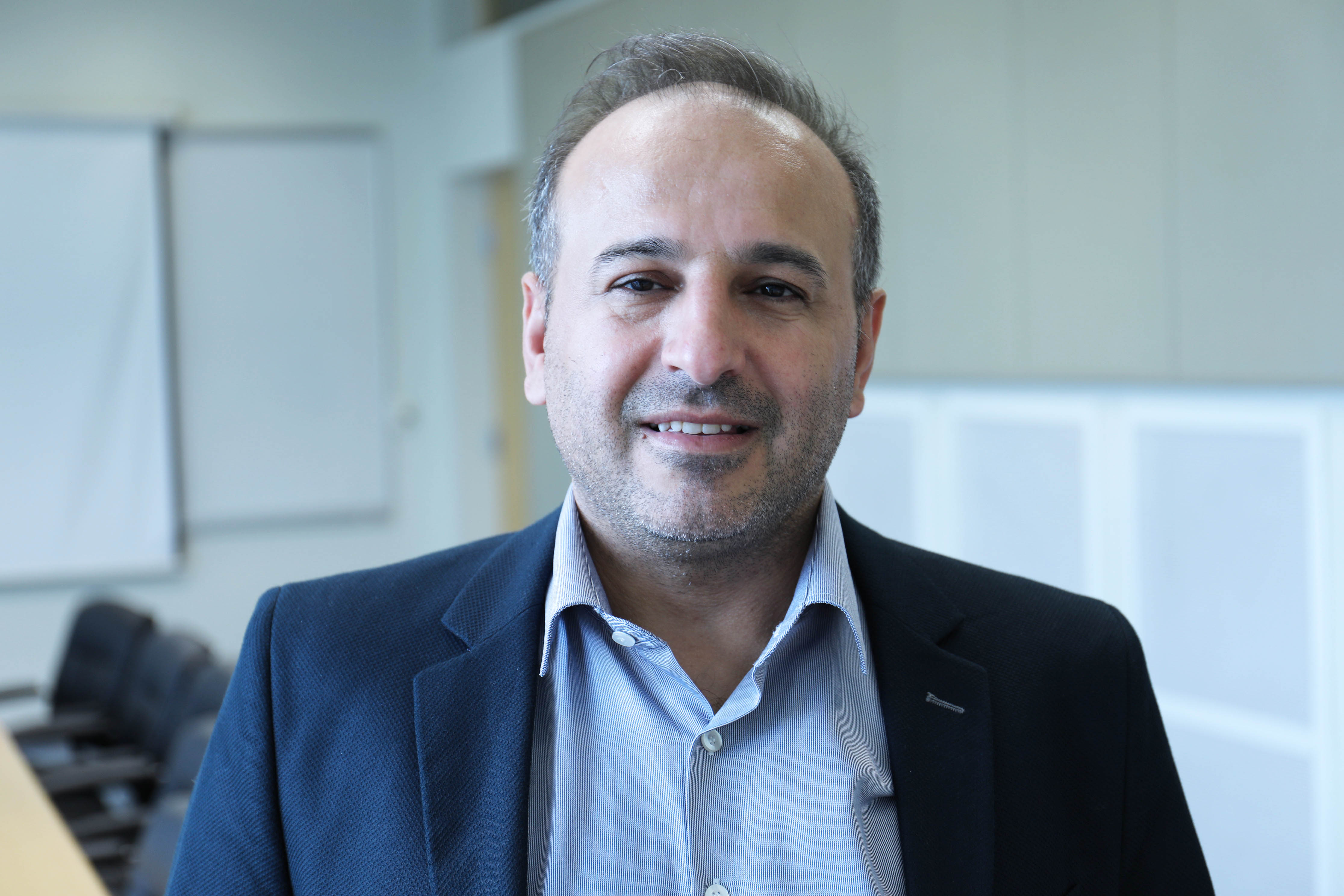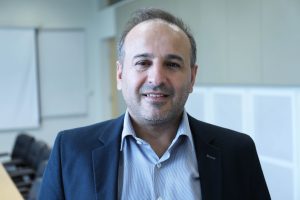
AUA Sits Down with Hrant Dink Fellow Dr. Muzaffer Senel
4 min read YEREVAN, Armenia – This September, the Political Science and International Affairs (PSIA) program of the American University of Armenia (AUA) hosted Assistant Professor Dr. Muzaffer Senel, also the director of Modern Turkish Studies at Istanbul Sehir University, who was in Armenia conducting research as a Hrant Dink Fellow. Following his one month stay, Dr. Senel agreed to talk to AUA about his mission in Armenia and share insights into his unique experience.
YEREVAN, Armenia – This September, the Political Science and International Affairs (PSIA) program of the American University of Armenia (AUA) hosted Assistant Professor Dr. Muzaffer Senel, also the director of Modern Turkish Studies at Istanbul Sehir University, who was in Armenia conducting research as a Hrant Dink Fellow. Following his one month stay, Dr. Senel agreed to talk to AUA about his mission in Armenia and share insights into his unique experience.
Through the Hrant Dink Foundation, set up in 2007 to carry on the dreams and mission of the assassinated Turkish-Armenian editor and journalist Hrant Dink in promoting peace and humanity between Turkey and Armenia, Dr. Senel was granted a one month scholarship to study Turkish-Armenian relations. At Istanbul Sehir University, there is an active Armenian studies center under the supervision of Professor Mohammad Fathi, who has close connections with the Hrant Dink Foundation. As a result of Professor Fathi’s initiative, the university has hosted several Armenian academics over the past three years. During interactions and discussions with visiting academics, Dr. Senel got the idea to travel to Armenia. “I had been to Georgia and Azerbaijan but I didn’t have a chance to visit Armenia. I discussed this with Zeynep Sungur, the Turkey-Armenia Fellowship Scheme Coordinator at Hrant Dink Foundation and told her that I had a plan to prepare an elite interview project in Armenia. She said it looked very promising. Now, I’m here doing a study on Turkish-Armenian relations in the eyes of Armenian intellectuals, practitioners, politicians, media people and celebrities who are the decision makers. Through these elite interviews I try to reach public intellectuals. Such a study has never been carried out in Armenia,” explained Dr. Senel.
Dr. Senel’s access to AUA’s world class facilities also played a large role in his research, particularly having use of the AGBU Papazian Library. “The library is the most important part for me in my work. I’m very thankful for this generosity. The resources I have in Istanbul I also have here at AUA,” Dr. Senel said. His experience at AUA also included delivering lectures to students. AUA Assistant Professor Vahram Ter-Matevosyan invited him to speak to his class about Turkish-Azeri relations, which was a great opportunity to interact with the students.
He admits that his month in Armenia has been a fascinating experience, although he doesn’t like to consider himself just a tourist who has come to spend time in a foreign country. Instead, he remarked that he came here to live and share his time, using public transportation, or “marshrutkas” (which he finds difficult to pronounce), going to the market, sitting in cafes, and using the metro in order to understand the capacities and capabilities of the country.
In general, Dr. Senel remarked that as a Turk he never faced problems in Armenia, and that people are very welcoming. His visit was especially significant because his paternal grandmother’s family had migrated to Anatolia from Javakhk, a majority Armenian community on the Georgian-Armenian border. While in Armenia he took the train to Gyumri, but unfortunately did not have the chance to go to the border. Dr. Senel also visited the pagan Temple of Garni, Geghard Monastery, Lake Sevan, and Etchmiadzin Cathedral.
“Armenia is small in territory but Armenian power is much bigger than you think,” he said. “Armenians are dispersed all over the world. They are a network society. The Armenians living in Canberra or Sydney share the same sense of being an Armenian and are proud of their nationality. This is their strong point, and it’s also a good opportunity to bring different civilizations into Armenia, and Syrian Armenians are a good example.”
One of the most striking things Dr. Senel found in Armenia was that at every step you can encounter the names and statues of well-known intellectuals, especially in the city center. He believes it’s good practice for Armenians to focus on the importance of public intellectuals, rather than politicians or soldiers, because it proves the Armenian mind is not militarized, despite ongoing conflicts with neighboring Turkey and Azerbaijan.
Of the country’s Russian history, Dr. Senel remarked, “The Soviet influence is still very much here, and the attitude is similar to most post-communist countries. I lived in Hungary, Poland and regularly visited eastern and European countries and many of them carry their Communist past with them in their daily lives.”
He also shared his thoughts and concerns about Armenian-Turkish relations, expressing certainty that the current tensions between the two countries are a result of bloody nationalism. “We may have very bad memories from the last 100 years and more, but before that we had a long history, more than a thousand years, of living together. We have learned from history that the relationship between Armenians and Turks was more than a friendship, it was a fraternity. But nationalism killed that, ”Dr. Senel said. He recalled an incident that occurred at Yerevan State University in which a man approached him and, upon hearing that he was from Turkey, said, “We are enemies.” The same reaction can be found among the Turks, he notes. “My colleagues from Turkey are also surprised that I’m in Armenia – not just Turks but also my international colleagues, friends and students. They want to know if I’m safe here. Even foreigners believe that if Armenians and Turks meet, they will kill each other.”
The Turkish professor believes that the problem lies in the lack of interaction between ordinary Turks and Armenians, and that a shift in that area can contribute to the waning of nationalism. For this to become a reality, he is sure that frequent mutual visits are a necessity. Taking into account the current political situations in both countries, Dr. Senel recommends paradiplomacy, or local government diplomacy in which ordinary people influence the government to take certain actions, as a solution. Dr. Senel believes that people should not wait for the state to take a step to normalize relations, and that revolutions formed from the bottom can be equally, if not more, effective in sparking positive change. He said, “When we look back at history, we see that during the Ottoman Empire many state positions were occupied by Armenians, for instance the foreign minister of the country was Armenian, because at that time the sense of belonging to the state was more important than to an ethnicity. Then ethnicity became more important and nationalism made its way into the agenda, which is the biggest trap for humanity and undermines our sense of being human.”
Dr. Senel’s wish is to have borderless South Caucasus. He claims that only then will we have a more independent and prosperous region. “I would like to bring back the culture of living together,” he concluded.
Founded in 1991, the American University of Armenia (AUA) is a private, independent university located in Yerevan, Armenia and affiliated with the University of California. AUA provides a global education in Armenia and the region, offering high-quality, graduate and undergraduate studies, encouraging civic engagement, and promoting public service and democratic values.
